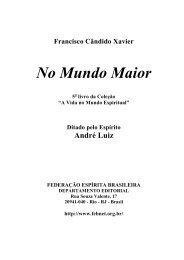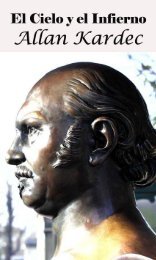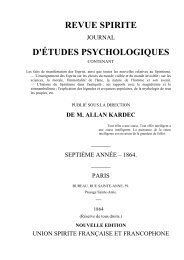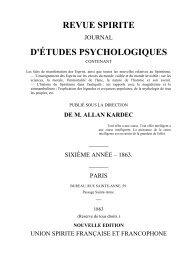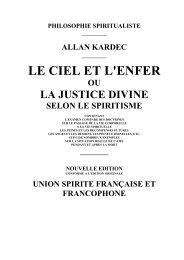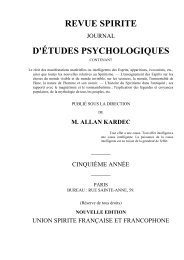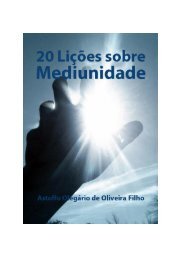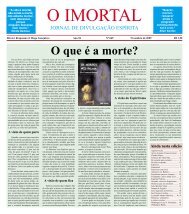PDF version - Geae
PDF version - Geae
PDF version - Geae
Create successful ePaper yourself
Turn your PDF publications into a flip-book with our unique Google optimized e-Paper software.
CHAPTER XV<br />
REINCARNATION AND INFANT PRODIGIES<br />
We can consider certain precocious manifestations of genius as proofs of pre-existence, in the sense<br />
that they are revelations of work accomplished by souls in anterior cycles. Phenomena of this kind could not<br />
have occurred by hazard without attachments to the past. History gives us accounts of prodigies of tender age<br />
with faculties so superior to, and having no correspondence with their ancestors, that the most subtle<br />
explanations of materialists fail to find an immediate cause. Michael Angelo, Salvator Rosa, Mozart, Paganini,<br />
Pascal, Rembrandt, can all be named in this class. Jacques Crichton, a Scottish lad who was called ‘The<br />
Admirable Crichton,’ was one of the word’s greatest wonders in precocity. William Hamilton, at the age of<br />
thirteen, knew twelve languages, and at eighteen he was called the greatest mathematician of the age. M.<br />
Trombette, born of a poor, uneducated family, learned Arabic by reading one book, Abel-el-Kadar; while in<br />
primary school he acquired French and German in two months. In several weeks he acquired Persian, while on<br />
shipboard in company with a Persian. At twelve, he learned Latin, Greek and Hebrew simultaneously. His<br />
friends say he knew three hundred Oriental dialects. The King of Greece made him Professor of Philosophy at<br />
Boulogne.<br />
At the International Congress of Psychology in Paris, 1900, Professor Charles Richet presented a<br />
Spanish child three and a half years old, named Pepito Arriola, who improvised upon the piano rich and varied<br />
airs. At the age of four and a half years he played six compositions of his own at the Royal Palace of Madrid<br />
before the King and Queen. His harmony was remarkable and his expression marvelous. The young artist has<br />
since become and incomparable violinist. The law of rebirth alone can explain many of these cases; their gifts<br />
are the results of immense labors which have familiarized their spirits with the arts and sciences. These<br />
manifestations of previous genius, while appearing abnormal, are nevertheless but the consequence of labor<br />
pursued through the centuries. Professor Frederick Myers calls this indestructible capital of the being the<br />
subliminal consciousness.<br />
The conceptions of right, justice, and duty are much keener in some people and races than in others:<br />
they are not merely the result of education, of the present, but of something deeper. Education only develops<br />
the germs already there. There are also strange anomalies of savage characters, which can only be explained by<br />
anterior lives. We see children exhibiting ferocious tendencies of cruelty to domestic animals and of theft,<br />
wholly inexplicable by their environment of heredity. In an opposite manner, we see children displaying<br />
devotion and self-sacrifice extraordinary for their age. Angels of goodness and virtue growing up in the midst<br />
of depravity, and thieves and assassins in virtuous families can only be explained by the theory of former lives.<br />
Each one brings with him at birth the fruits of evolution and the tastes and tendencies he has acquired in all<br />
directions. The spirit is capable of diverse studies, but in the limited course of terrestrial life, and through the<br />
effect of material conditions, each soul is usually restricted in its studies.<br />
As soon as the will is directed toward one of the domains of vast knowledge by the fact of its<br />
accumulated tendencies, its superiority in that direction is displayed and returns more and more accentuated<br />
with each life. It is so the child prodigies come, with the genius and talents which are the results of continuous<br />
progressive efforts toward a determined object. Nevertheless, the soul being called to enter into all kinds of<br />
knowledge and not restrict itself to any one, successive states of education are necessary to its unlimited<br />
development. We have behind us infinite reminiscences and souvenirs; before us, another infinity of promises<br />
and hopes. But in all this splendor of life, the greater part of humanity sees only and wishes only to see mean<br />
fragments of actual existence - and existence which it believes without a yesterday or a tomorrow. This is the<br />
cause of the weakness of philosophical thought and moral action in our epoch. The work already effected by<br />
each spirit can be easily calculated when measured by the rapidity with which it assimilates the elements of<br />
any kind of science whatever. By this explanation the difference in individuals who have here enjoyed the<br />
same advantages can be readily understood which would remain incomprehensible otherwise. Two people<br />
equally intelligent, studying the same subject with the same masters, do not assimilate in the same manner.<br />
One seizes the ideas at a glance, the other can penetrate them only by slow, sustained labor. One has but to<br />
penetrate the reservoir of his past, the other is meeting these problems for the first time. One person accepts a<br />
77



